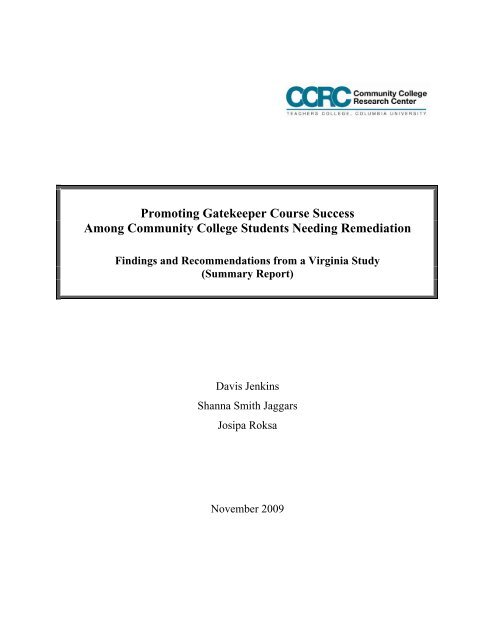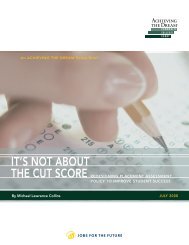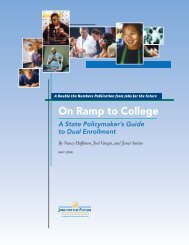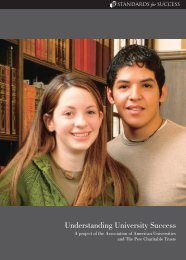Promoting Gatekeeper Course Success Among ... - Cfder.org
Promoting Gatekeeper Course Success Among ... - Cfder.org
Promoting Gatekeeper Course Success Among ... - Cfder.org
Create successful ePaper yourself
Turn your PDF publications into a flip-book with our unique Google optimized e-Paper software.
<strong>Promoting</strong> <strong>Gatekeeper</strong> <strong>Course</strong> <strong>Success</strong><strong>Among</strong> Community College Students Needing RemediationFindings and Recommendations from a Virginia Study(Summary Report)Davis JenkinsShanna Smith JaggarsJosipa RoksaNovember 2009
Acknowledgments: Funding for the study was provided by the Virginia Community College System.Additional funding was provided by Lumina Foundation for Education through a grant to CCRC as part ofAchieving the Dream: Community Colleges Count.Address correspondence to:Davis JenkinsCommunity College Research CenterTeachers College, Columbia University525 West 120 th Street, Box 174New York, New York 10027Tel.: 212-678-3091Email: davisjenkins@gmail.comVisit CCRC’s website at: http://ccrc.tc.columbia.edu
Introduction and OverviewThis report summarizes key findings and recommendations from a Community CollegeResearch Center (CCRC) study designed to help community colleges develop strategies forimproving the rate at which academically underprepared students take and pass initialcollege-level (or “gatekeeper”) courses in math and English. CCRC conducted the study atthe request of the Virginia Community College System (VCCS) to inform the system’sstrategic objective of improving retention and academic success for their students,particularly the large number of students who arrive unprepared for college-level work. Thestudy examined student characteristics, course-taking patterns, and other factors associatedwith higher probabilities that students who require remediation will take and pass math andEnglish gatekeeper courses.A detailed report on the study (Roksa, Jenkins, Jaggars, Zeidenberg, & Cho, 2009) isavailable on the CCRC website. Although the study was based on an analysis of students inVirginia’s community colleges, the patterns of and reasons for student success in gatekeepercourses may well be common to many community colleges. Moreover, the analyses CCRCconducted as part of the study might serve as useful models for other colleges and statesystems interested in analyzing patterns of progression and success. This paper is intended tostimulate discussion and inquiry among community college educators seeking to improvedegree completion rates for the many students who come to them poorly prepared to succeedin college-level work.Research MethodsThe dataset used by CCRC was provided by VCCS and contained information on a cohort of24,140 first-time college students who enrolled in a VCCS college in the summer or fall 2004terms. It included information on student demographics, institutions attended, placement testscores, and placement recommendations; transcript data on courses and grades; andinformation on educational attainment (including transferring to four-year institutions andearning certificates and associate degrees). Students were followed for four years, throughthe 2008 summer term. CCRC examined a range of educational outcomes for this cohort,including: whether students took and passed developmental courses and gatekeeper Englishand math, the number of terms students were enrolled, the number of credits theyaccumulated, and whether they earned educational awards (certificates and associate degrees)or transferred to a four-year institution.CCRC’s analyses focused in particular on educational progression of students who were inneed of developmental education. We used three different indicators of the need fordevelopmental education: students’ placement test scores; course placementrecommendations; and whether or not students took developmental courses in reading,writing, or math. While the three markers were correlated, their correspondence was far fromperfect; each provided different insights into students’ educational pathways and outcomes.The full report (Roksa et al., 2009) presents results separately by each of these indicators, andit discusses in detail the extent and implications of missing data issues that were observed forCCRC: VCCS <strong>Gatekeeper</strong> Summary Report 1
ecommended, over a third did not take any developmental course in the recommendedsubject. Thirty-nine percent of students who were recommended to take a developmentalmath course did not do so. Similarly, 35 percent of students who were recommended to takea developmental writing course and 41 percent who were recommended to take adevelopmental reading course did not take any developmental courses in those subject areas.Figure 2: Enrollment in Developmental <strong>Course</strong>sby Placement RecommendationDevelopmental Enrollment100%80%60%40%20%0%41%35% 39%4%5%10%55% 60%51%Reading Writing MathTook Recommended Took Another Took NoneFinding:Most students did not complete the recommended developmentalsequence, both because they did not enroll in recommended coursesand, to a lesser extent, because they did not pass the developmentalcourses that they took.Figure 3 shows the rate at which students who placed into transfer programs completed thefull sequence of developmental courses in a given subject, with each bar representingstudents referred to a particular level of developmental coursework in that subject. Mostcommunity colleges in Virginia offer three levels of developmental math (labeled “highest,”“middle,” and “lowest”), and two levels of developmental reading and writing (labeled“highest” and “lowest”). The majority of transfer-placed students did not complete therecommended developmental sequence, both because they did not enroll in recommendedcourses and, to a lesser extent, because they did not pass the developmental courses theytook. Students referred to the lowest levels of developmental instruction fared particularlypoorly. For example, among students referred to the lowest level of developmental math, 47percent did not enroll in any developmental math course; 43 percent enrolled in one or moredevelopmental math courses but did not pass one of those courses, thereby never completingthe sequence; and only 10 percent successfully completed the developmental sequence. Incontrast, among students referred to the highest level of developmental mathematics (whorequired only one course to complete the sequence), 60 percent did not enroll in the requiredCCRC: VCCS <strong>Gatekeeper</strong> Summary Report 3
course; 16 percent enrolled, but did not pass the course; and 24 percent completed the course.At all levels and in every subject, transfer-placed students did not complete thedevelopmental sequence largely because they did not enroll in the recommended courses, notbecause they did not pass the developmental courses they enrolled in.Figure 3: Developmental Enrollment and Performance*ReadingReferred toTotalHighestLowest52%46%63%13%15%33%41%17% 20%0% 20% 40% 60% 80% 100%Not enrolled Not passedCompletedWritingReferred toTotalHighestLowest50%42%57%17% 33%15% 43%19% 24%0% 20% 40% 60% 80% 100%Not enrolled Not passed CompletedMathTotal49%32%20%Referred toHighestMiddle60%44%16%35%24%22%Lowest47%43%10%0% 20% 40% 60% 80% 100%Not enrolled Not passed Completed*Note: Rates are for students in transfer programs only.CCRC: VCCS <strong>Gatekeeper</strong> Summary Report 4
Figure 5: Enrollment in <strong>Gatekeeper</strong> <strong>Course</strong>sFigure 6 compares gatekeeper enrollment rates among students who were referred to collegelevelcourses (“College-Level”), those recommended to developmental education who tookat least one such course (“Dev – Took”), and those recommended to developmentaleducation who skipped the developmental sequence (“Dev – Skipped”). Students who werenot recommended to take a developmental course in a given subject were far more likely toenroll in a gatekeeper course for that subject. Yet among students who were recommended totake developmental instruction, the rate at which they enrolled in gatekeeper courses did notdiffer much depending on whether or not they complied with the placement recommendation.In fact, among students referred to developmental math, a somewhat higher percentageenrolled in gatekeeper math without taking the recommended developmental courseworkthan did those who followed the recommendation and took a developmental course (35percent versus 31 percent).CCRC: VCCS <strong>Gatekeeper</strong> Summary Report 6
Figure 7: Predicted Probability of Passing <strong>Gatekeeper</strong> English, by ReadingTest Score Quartiles, for Students Placed in Transfer Programs100%80%78% 76% 77% 79%60%40%20%0%1st quartile 2nd quartile 3rd quartile 4th quartileFinding:The proportion of students completing gatekeeper courses was low,especially for students referred to the lowest level of developmentaleducation. However, the low overall completion rate emerged largelybecause students did not enroll in these courses. <strong>Among</strong> those who didenroll in gatekeeper courses, pass rates were fairly high.Only 47 percent of students in the summer/fall 2004 entering cohort completed gatekeeperEnglish within four years, and a mere 26 percent completed gatekeeper math. Focusing onthose students who enrolled in developmental education, Figure 8 shows the proportion ofstudents in transfer programs who never enrolled in the corresponding gatekeeper course,who enrolled but did not pass, and who eventually passed the gatekeeper course (with a gradeof C or better). <strong>Gatekeeper</strong> completion rates were especially low among transfer-placedstudents referred to the lowest level of developmental instruction. For example, only 8percent of students referred to the lowest-level developmental math course completedgatekeeper math, compared with 46 percent of students in the highest level of developmentalmath.CCRC: VCCS <strong>Gatekeeper</strong> Summary Report 8
Figure 8: <strong>Gatekeeper</strong> Enrollment and Performance*ReadingTotal41%14%45%Referred toHighestLowest36%49%16% 48%12% 39%Referred toTotalHighestLowest0% 20% 40% 60% 80% 100%WritingNot enrolled Not passed Passed42% 14% 44%36% 15%48%48% 13% 39%0% 20% 40% 60% 80% 100%Not enrolled Not passed PassedMathTotal69%8%23%Referred toHighestMiddle37%16% 46%75% 6%18%Lowest88%4% 8%0% 20% 40% 60% 80% 100%Not enrolled Not passed Passed*Note: Rates are for students in transfer programs only.In general, low overall completion rates emerged largely because students did not enroll ingatekeeper courses. Over one third of students did not attempt to take gatekeeper English andtwo thirds did not enroll in gatekeeper math. Non-enrollment in gatekeeper courses was evenmore pronounced among students who were recommended to take developmental courses.Students who did enroll in gatekeeper courses had a reasonably high degree of success: 77percent of students passed gatekeeper English with a grade of C or higher, and 73 percentpassed gatekeeper math. Similar patterns held for students placed in transfer and career techprograms. This result is consistent with findings from research by CCRC on collegesinvolved with the Achieving the Dream initiative, a national community college reform effort(Bailey, Jeong, & Cho, 2009). Thus, for community colleges in Virginia and elsewhere, a keychallenge is motivating students to enroll in gatekeeper courses in the first place.CCRC: VCCS <strong>Gatekeeper</strong> Summary Report 9
Finding:<strong>Gatekeeper</strong> course pass rates were similar across students whoenrolled in different levels of developmental education. <strong>Gatekeeper</strong>course pass rates also did not vary strongly by whether or not studentscomplied with their developmental course recommendation.<strong>Among</strong> students who enrolled in a gatekeeper course, rates of passing (with a C or better) didnot differ markedly between those who previously took developmental courses and thosewho did not (see Figure 9). About three quarters of students who took no developmentalreading or writing but later enrolled in gatekeeper English were able to pass the course with aC or better. Similar percentages of students who enrolled in different levels of developmentalcoursework in reading or writing completed gatekeeper English. Even in math, where gaps ingatekeeper enrollment were more pronounced, differences in gatekeeper passing ratesbetween students who did and did not take developmental math were relatively small.Moreover, gatekeeper passing rates did not differ by whether students followed theirplacement recommendation. <strong>Among</strong> students recommended to developmental education wholater enrolled in gatekeeper courses, those who complied with developmentalrecommendations had similar rates of passing with a C or better compared to those who didnot comply (Figure 10).Figure 9: Performance in <strong>Gatekeeper</strong> <strong>Course</strong>s<strong>Gatekeeper</strong> Pass Rate100%80%60%40%20%0%78% 78% 76%73% 74% 72% 74% 76% 74%68%Reading Writing MathNo DevDev - MidDev - HighestDev - LowestCCRC: VCCS <strong>Gatekeeper</strong> Summary Report 10
Figure 10: Performance in <strong>Gatekeeper</strong> <strong>Course</strong>s<strong>Gatekeeper</strong> Pass Rate100%80%60%40%20%0%78%76% 74% 74% 75% 75% 74%72%68%Reading Writing MathCollege-Level Dev - Took Dev - SkippedThese findings seem to conflict with one other. The finding that students who tookdevelopmental courses did about as well in gatekeeper course as those who did not (Figure 9)might be interpreted to indicate that developmental education enables those who complete itto succeed in gatekeeper courses. Yet, the finding that students who were recommended todevelopmental education but skipped it did as well as those who took developmental courses(Figure 10) suggests that developmental instruction does not make a difference.In fact, these findings cannot indicate whether or not developmental education is effective.CCRC was able to determine that there is a correlation between student behaviors (such astaking developmental courses or complying with a developmental recommendation) andsuccess in gatekeeper courses; but this does not imply a causal relationship. It may be thatstudents who are referred to developmental instruction but nevertheless skip it differ fromstudents who enroll in developmental coursework in their level of motivation or otherunobserved characteristics. Similarly, students who take and complete a developmentalsequence may be especially motivated or otherwise different in ways that would explain thefact that they do as well in gatekeeper courses as students who do not participate indevelopmental instruction. The results do indicate that it would be useful to explore whysome students decide to forego developmental instruction and are nevertheless successful incompleting gatekeeper courses and other educational outcomes.CCRC: VCCS <strong>Gatekeeper</strong> Summary Report 11
Finding:There was substantial variation among Virginia community colleges inthe rates at which students enrolled in and passed developmental andgatekeeper courses.<strong>Among</strong> Virginia’s community colleges, the proportion of entering students who enrolled indevelopmental reading ranged from 5 percent to 25 percent. Similar variation was evident fordevelopmental writing and math. The proportion of students enrolling in gatekeeper Englishranged from 50 percent to 71 percent; the range for gatekeeper math was even wider, from 17percent to 50 percent.<strong>Among</strong> students who enrolled in gatekeeper English, pass rates ranged from an average of 66percent to 85 percent; average math pass rates ranged from 58 percent to 89 percent acrossinstitutions. The correlation between gatekeeper enrollment and pass rates at the institutionallevel was very weak, indicating that some institutions are more successful at getting studentsto take these courses, while others are more successful at getting them to pass the courses.Similarly, some institutions are better at helping students take and pass gatekeeper Englishwhile others are more effective at getting students to take and pass gatekeeper math. Thesedifferences indicate that every Virginia community college has something to offer as well assomething to learn from the others in the system.Finding:Similar patterns were observed with respect to other academicoutcomes.The CCRC study examined an array of other academic outcomes, including attempting andaccumulating college credits, earning certificates or associate degrees, and transferring tofour-year institutions. Results for these academic outcomes followed similar patterns as thosefor gatekeeper success: students who enrolled in lower levels of developmental instructiondid more poorly, and students who did not comply with developmental recommendations didjust as well as those who complied. For example, only 18 percent of students starting in apre-algebra course (the lowest level of developmental math) earned a certificate or associatedegree or transferred to a four-year institution, compared with 39 percent of students whostarted math in Algebra II or higher. Similar differences in success rates, though perhaps notso stark as in math, were evident in reading and writing.Taking and passing college-level English and math are only two of several milestones on theway to success in college. Still, they are important both because they are generally requiredfor degree programs and because their attainment is associated with increased chances ofearning a credential or transferring to four-year institutions. Given that similar patterns areobserved in other key outcomes, it is important to better understand why some students takeand pass gatekeeper courses while others do not, and to identify strategies colleges can use toincrease students’ success in these gatekeepers and beyond.CCRC: VCCS <strong>Gatekeeper</strong> Summary Report 12
RecommendationsBased on the findings from the study summarized here, CCRC made recommendations to theVirginia community colleges toward the goal of improving the success of academicallyunprepared students in gatekeeper courses. The recommendations presented here are thosethat may be applicable to colleges outside Virginia.Recommendation: Colleges should investigate why students recommended to takedevelopmental instruction do not take these courses.CCRC’s analyses of developmental course-taking in Virginia’s community colleges likelyunderestimate the extent of the need for remediation, as some schools were missing largeamounts of placement recommendation data. Yet even the available data indicate that overone third of students recommended for a developmental course in reading, writing, or mathdid not take a single developmental course in that subject. Colleges with similar patterns ofnon-compliance should ask students (through focus groups and surveys) why they choose tocircumvent these requirements.Recommendation: Since students who did not follow their placementrecommendations fared as well as students who wererecommended for and took developmental courses, collegesshould investigate this phenomenon further and learn fromstudents about alternative strategies for success.Students who were recommended for but did not take developmental courses fared equallywell (with respect to taking and passing gatekeeper courses and the other educationaloutcomes examined) as did students who were recommended for and enrolled indevelopmental courses. This finding suggests that failing to follow placementrecommendations is not always detrimental to student success. It is important to note that thefinding does not imply that developmental instruction is not effective or not needed. Studentswho skip developmental courses may differ from those who enroll in them with respect to anumber of unobserved characteristics, which may account for their higher success rates.However, these results suggest that it would be useful to explore why some students foregodevelopmental instruction and are nevertheless successful.Recommendation: When considering the effectiveness of developmental instructionor developing policies and practices to facilitate student success,colleges should consider the level of developmental coursestaken by students instead of grouping all students in need ofremediation together.Not all Virginia community college students who required remediation fared the same.Analyses separating students by level show that students who started community colleges inthe lowest level of developmental courses did less well with respect to all outcomesexamined, including completing developmental courses, completing gatekeeper courses,accumulating credits, or earning credentials. These patterns persisted even after controllingCCRC: VCCS <strong>Gatekeeper</strong> Summary Report 13
for individual characteristics, including test scores and institutions attended. Even when wecontrolled for student demographics and other factors that might bear on success (see the fullreport for details), the gaps between students starting in the lowest level of developmentalcourses and other students were notable, particularly for math.Recommendation: Colleges might consider recommending alternative enrollmentpathways for students in the lowest level of developmentalcourses.Given the low rates of success for students recommended to the lowest developmentalcourses on entry, colleges may want to consider alternative approaches to facilitating theireducational success. For example, colleges may consider encouraging such students to enrollin occupational certificate programs that do not require college-level math and English as anintermediate step toward eventually earning a degree. Community colleges in WashingtonState have seen promising results from programs that enable adult basic skills students (manyof whom are at a level of readiness similar to that of the lowest level developmental students)to enter and succeed in occupational certificate programs. In the approach developed by theWashington colleges, known as I-BEST, adult basic skills students enroll in college-levelcareer technical programs that are jointly taught by basic skills and career-technicalinstructors (Jenkins, Zeidenberg, & Kienzl, 2009).Recommendation: Colleges should consider surveying students to learn why somany are not enrolling in gatekeeper courses and developpolicies to motivate gatekeeper enrollment.Many students examined in this study did not complete gatekeeper courses, not because theydid not pass these courses, but because they never enrolled in them. Approximately one thirdof students never enrolled in gatekeeper English and two thirds never attempted gatekeepermath. Low gatekeeper enrollments were apparent for all groups of students — those withdifferent test scores, those in academic transfer and career-technical programs, and thosetaking different levels of developmental courses — but rates were particularly low amongstudents starting in the lowest level of developmental courses. Students who did enroll ingatekeeper courses had a relatively high degree of success: 77 percent passed gatekeeperEnglish and 73 percent passed gatekeeper math. Moreover, developmental students whoenrolled in gatekeeper courses were approximately equally likely to succeed regardless oftheir starting point.It is not clear whether students’ lack of enrollment in gatekeeper courses was due to limitedcapacity to enroll students who needed such courses, problems with scheduling, lack ofcounseling and/or of students’ understanding of the courses they needed to take, or otherreasons. Surveying students to understand why they are not enrolling in these courses wouldhelp to illuminate factors deterring students from gatekeeper courses and inform thedevelopment of policies to motivate and facilitate enrollment in gatekeeper courses.CCRC: VCCS <strong>Gatekeeper</strong> Summary Report 14
Recommendation: Colleges should explore strategies for increasing enrollment ingatekeeper math, given the low rate of participation in suchcourses.While not taking gatekeeper math courses was an issue for many students, it was particularlypronounced among students in need of remediation (whether that is defined by test scores,placement recommendations, or actual enrollment in developmental courses). Given lowgatekeeper math enrollment rates, colleges should explore strategies for increasingenrollment in math, which may entail working with high schools to improve mathpreparation, providing summer bridge programs, altering the structure of developmentalinstruction in math, or providing alternatives to College Algebra that teach studentsmathematics relevant to the degree programs and career fields they are seeking to enter.Recommendation: Colleges might investigate whether “mainstreaming” somestudents, particularly those referred to the highest level ofdevelopmental coursework in a given subject area, directly intocollege-level courses, while providing additional supports asneeded, is an effective strategy for facilitating their educationalattainment.Some students referred to developmental education chose to circumvent thoserecommendations, and yet they were able to succeed at a rate similar to those that compliedwith placement recommendations. Placement tests do not purport to capture the completerange of factors that allow students to succeed (for example, personal motivation andinterpersonal supports). Accordingly, it may be appropriate to allow some students who scorebelow the college-ready threshold to attempt college-level classes, particularly if suchstudents are supplied with systematic academic and non-academic supports. Programs thatattempt to accelerate the progress of remedial students into college-level courses by offeringdevelopmental instruction concurrently with related college-level courses or by integratingacademic support into college courses have shown some promise (see, e.g., Bragg & Barnett,2009; Scott, 2003; Wlodkowski 2003; Wlodkowski & Kasworm, 2003), although theseapproaches have not yet been rigorously evaluated (Bailey, 2009).Recommendation: Colleges should review policies and practices aimed atincreasing gatekeeper course completion among college-readystudents, and look for promising practices both within andoutside the system.Even among students who were reasonably well prepared academically, many did not makegood progress toward a degree. Over 15 percent of students in the top quartiles of the readingand writing tests did not enroll in gatekeeper English, and 25 percent of students in the topquartile of the college algebra test did not enroll in gatekeeper math. This finding indicatesthat academic preparation (or lack thereof) is not the only factor that needs to be addressed toimprove gatekeeper enrollment rates. Understanding why even students who are consideredprepared for college-level work are not achieving key milestones is an important step inenhancing overall success rates. It is likely that policies designed to assist academicallyCCRC: VCCS <strong>Gatekeeper</strong> Summary Report 15
prepared students to complete gatekeeper courses will also be beneficial for students in needof remediation.Recommendation: Colleges should examine the practices of their peers that aremore effective in enabling student success and should sharepromising practices. State systems should facilitate thisexploration and sharing.There was much variation across the Virginia community colleges in the rates at whichstudents enrolled and passed gatekeeper courses. For example, the average proportion of thecohort who enrolled in gatekeeper math in the four-year study period ranged from 17 percentin one school to 50 percent in another. In addition, some institutions are more successful atgetting students to enroll in gatekeeper courses, while others are more successful at gettingenrolled students to pass them. Similarly, some institutions are better at helping studentsprogress through gatekeeper English, while others are more effective in terms of gatekeepermath. Thus all institutions have something to offer as well as something to learn from theothers.To provide research-based guidance on this issue, CCRC is partnering with VCCS on astudy, funded by the Bill and Melinda Gates Foundation, of colleges identified throughquantitative analysis as comparatively effective (controlling for student characteristics andother factors) in enabling students to take and pass gatekeeper English and math. VCCS hasalso received funding from the Gates and Lumina foundations through the Achieving theDream initiative to <strong>org</strong>anize discussion of college-level data on student attainment of keymilestones and sharing of promising practices for improving student success among colleges.Five other states (Connecticut, Florida, North Carolina, Ohio, and Texas) are involved in theinitiative and are engaged in similar activities. The approach these states are following hasthe potential to promote systemic changes that benefit large numbers of students and toinform changes in state policy that provide colleges with resources and incentives to continueto innovate over time. For this reason, other states should consider following their lead.CCRC: VCCS <strong>Gatekeeper</strong> Summary Report 16
ReferencesBailey, T. (2009). Challenge and opportunity: Rethinking the role and function ofdevelopmental education in community college. New Directions for CommunityColleges, 145, 11–30.Bailey, T., Jeong, D. W., & Cho, S. (2009). Referral, enrollment, and completion indevelopmental education sequences in community colleges. Economics of EducationReview (in press). Online version available at doi:10.1016/j.econedurev.2009.09.002Bragg, D., & Barnett, E. (2009). Lessons learned from Breaking Through (OCCRL Brief).University of Illinois at Urbana-Champaign, Office of Community College Researchand Leadership. Retrieved fromhttp://occrl.ed.uiuc.edu/Publications/In_Brief/Breaking-Thru4-09.pdfJenkins, D., Zeidenberg, M., & Kienzl, G. (2009, May). Educational outcomes of I-BEST,Washington State Community and Technical College System’s Integrated BasicEducation and Skills Training Program: Findings from a multivariate analysis(CCRC Working Paper No. 16). New York: Columbia University, Teachers College,Community College Research Center. Available athttp://ccrc.tc.columbia.edu/Publication.asp?uid=692Scott, P. (2003). Attributes of high-quality intensive courses. New Directions for Adult andContinuing Education, 97, 29–38.Roksa, J., Jenkins, D., Jaggars, S. S., Zeidenberg, M., & Cho, S. (2009, November).Strategies for promoting gatekeeper success among students needing remediation:Research report for the Virginia Community College System. New York: ColumbiaUniversity, Teachers College, Community College Research Center. Available athttp://ccrc.tc.columbia.edu/Publication.asp?UID=714Wlodkowski, R. J. (2003). Accelerated learning in colleges and universities. New Directionsfor Adult and Continuing Education, 97, 5–16.Wlodkowski, R. J., & Kasworm, C. (2003). Editors’ notes. New Directions for Adult andContinuing Education, 97, 1–3.CCRC: VCCS <strong>Gatekeeper</strong> Summary Report 17






